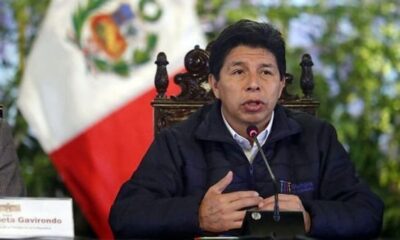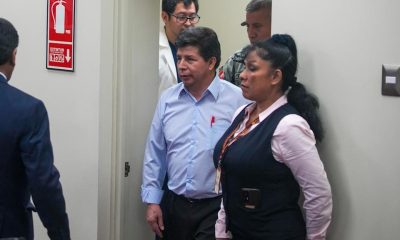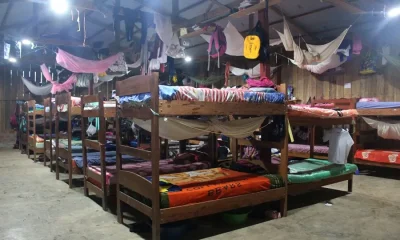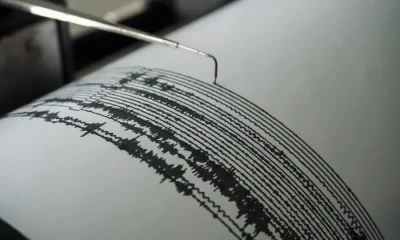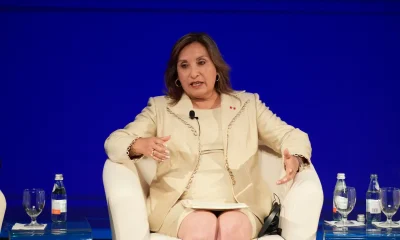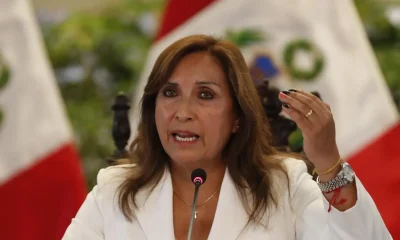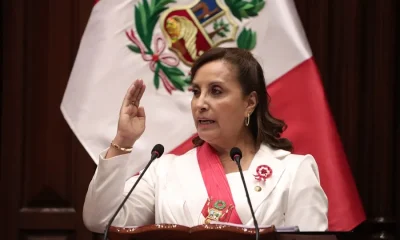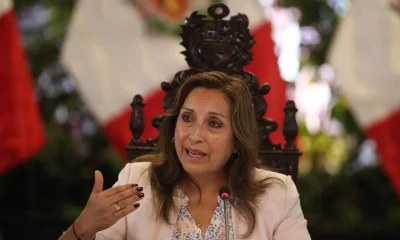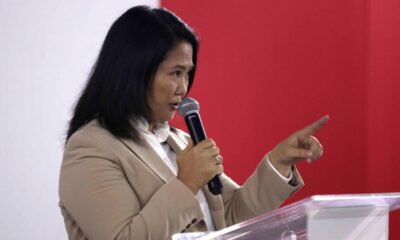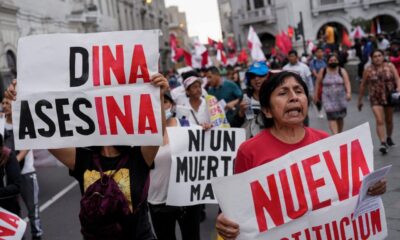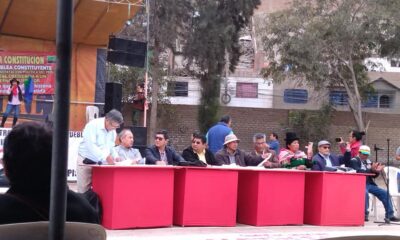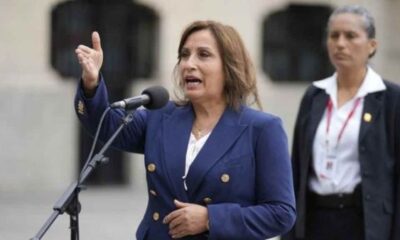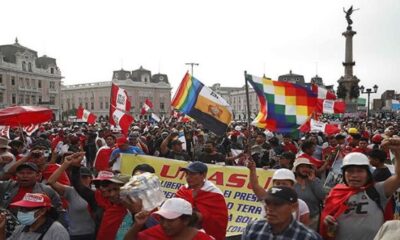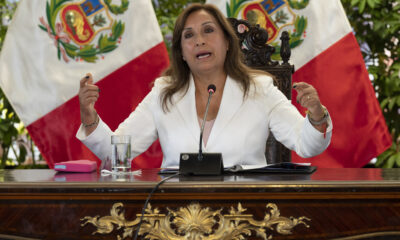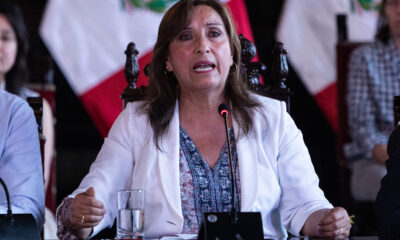International
The president of Peru calls on opponents to establish “a pact for governance”
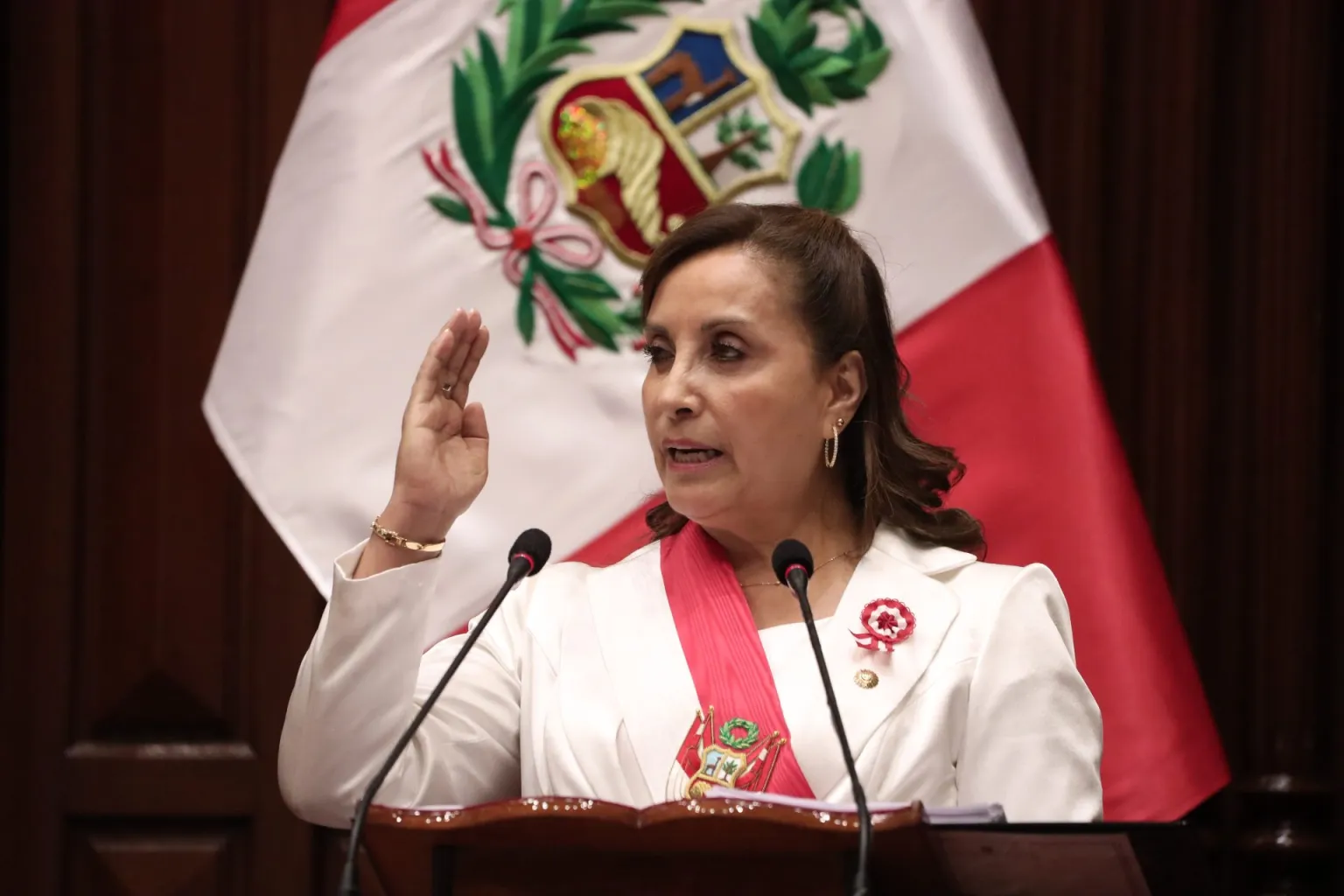
The president of Peru, Dina Boluarte, invoked her political opponents this Sunday to establish “a pact for the governance” of her country that allows, as she said, to fulfill “the historical responsibility” of meeting the needs of the 33 million Peruvians.
“Away from the voices that divide, that expect us to give up, that we go back on this road for the struggle for the progress of the homeland, he invoked a pact for Peru, a pact for governability, for democracy,” Boluarte said during a ceremony held at the Government Palace of Lima.
The president made this approach two days after the plenary of Congress refused to admit to processing three motions for vacancy (dismissal) that had been presented against her by opposition legislators, mostly from left-wing political groups.
Boluarte added that “a divided, intolerant country, even if it is a minority group that moves these aspects that I indicate, affects unity.”
“The country demands the unity of its authorities to move forward,” he emphasized.
The head of state also remarked that “all” politicians have “a historical responsibility with the more than 33 million Peruvians.”
“Therefore, work in unity, as I always say, in a single patriotic heart, will make our homeland bigger, and that within it Peruvians have greater rights,” he concluded.
Last Friday, the Prime Minister of Peru, Gustavo Adrianzén, said that the Executive “will not allow governance to be broken in his country,” referring to the three motions of dismissal presented against Boluarte.
“We tell that small group of benches and parliamentarians that they are not going to make it, that we are not going to allow someone to want to break the governance of the country to lead us to instability and chaos,” he said.
The three motions, which were rejected by a simple majority, called for the dismissal of Boluarte for an alleged moral inability to exercise the head of state and demanded that he offer explanations for the latest complaints that have been made against him, which are also investigated by the Prosecutor’s Office.
Among the arguments was an alleged “abandonment from office,” which a journalistic complaint pointed out by Boluarte for 12 days between the end of June and the beginning of July 2023 to undergo alleged aesthetic procedures.
Also, his alleged involvement in the investigation against one of his brothers, Nicanor Boluarte, by deactivating a police team that supported a prosecutor’s group that specifically prosecutes the crimes of corruption committed by senior public officials a day before his preliminary arrest.
In this case, the Public Ministry opened a preliminary investigation of the president for the alleged commission of the crime against the administration of justice, in the form of personal cover-up.
International
Winter Storm Fern Leaves 30 Dead and Over One Million Without Power Across the U.S.
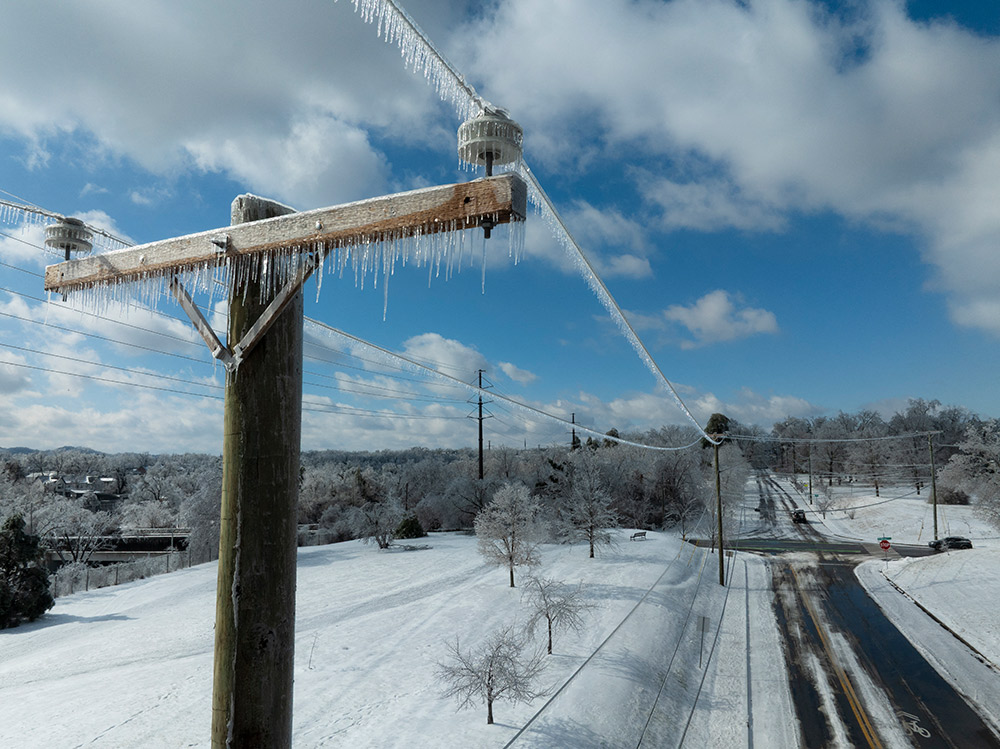
The massive winter storm Fern, bringing polar temperatures, battered large portions of the United States for a third consecutive day on Monday, leaving at least 30 people dead, more than one million households without electricity, and thousands of flights grounded.
In the Great Lakes region, residents awoke to extreme cold, with temperatures dropping below -20°C. Forecasts indicate that conditions are expected to worsen in the coming days as an Arctic air mass moves south, particularly across the northern Great Plains and other central regions, where wind chills could plunge to -45°C, temperatures capable of causing frostbite within minutes.
Across the country, heavy snowfall exceeding 30 centimeters in roughly 20 states triggered widespread power outages. According to PowerOutage.com, nearly 800,000 customers remained without electricity on Monday morning, most of them in the southern United States.
In Tennessee, where ice brought down power lines, approximately 250,000 customers were still without power. Outages also affected more than 150,000 customers in Mississippi and over 100,000 in Louisiana, as utility crews struggled to restore service amid dangerous conditions.
International
Spain approves plan to regularize up to 500,000 migrants in Historic Shift
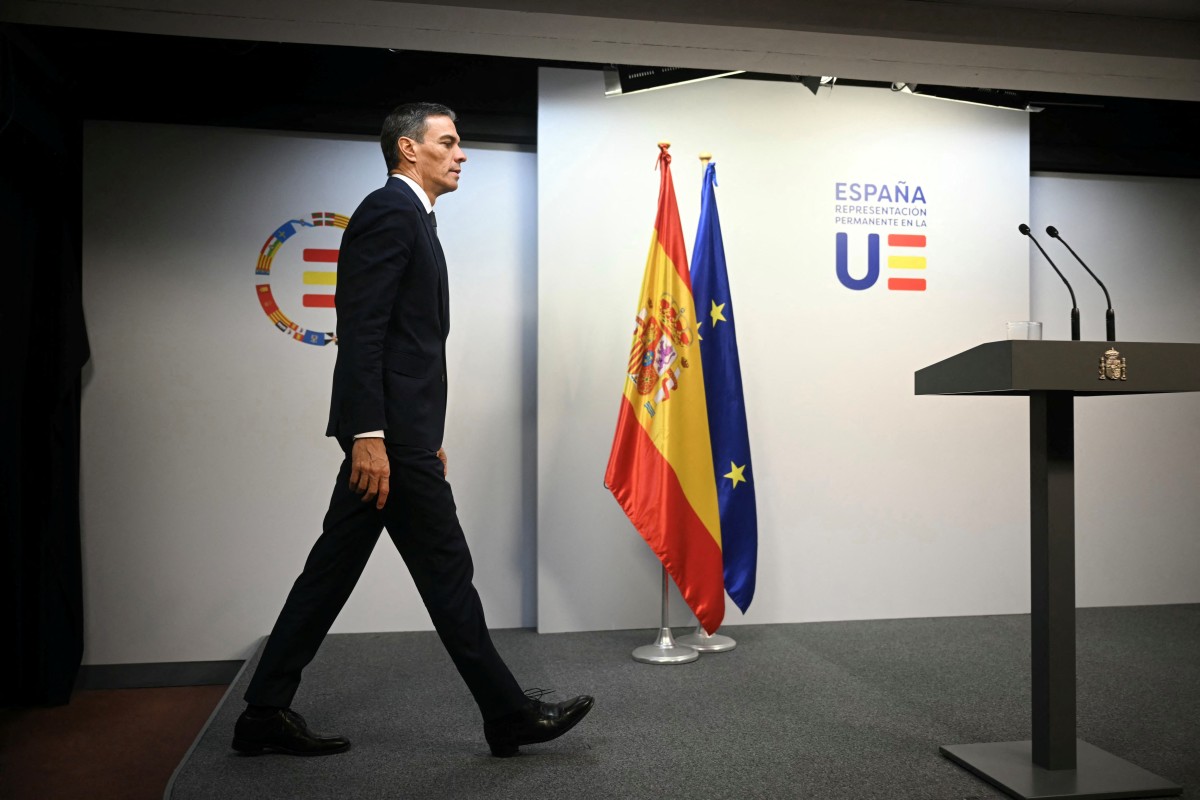
In November 2024, Spanish Prime Minister Pedro Sánchez announced a reform of the country’s immigration regulations aimed at regularizing 300,000 migrants per year over a three-year period, in an effort to counter population aging in a country where births have fallen by 25.6% since 2014, according to official data.
Going against the trend in much of Europe, Spain’s left-wing government has now approved an exceptional migrant regularization plan that could benefit up to 500,000 people, most of them from Latin America.
The measure will allow the regularization of around “half a million people” who have been living in Spain for at least five months, arrived before December 31, 2025, and have no criminal record, Migration Minister Elma Saiz explained on public television.
The plan, approved on Tuesday by the Council of Ministers, establishes that applications will be processed between April and June 30, enabling beneficiaries to work in any sector and anywhere in the country, Saiz said.
“Today is a historic day for our country. We are strengthening a migration model based on human rights, integration, and one that is compatible with economic growth and social cohesion,” the minister later stated at a press conference.
The socialist government of Pedro Sánchez stands out within the European Union for its migration policy, contrasting with the tightening of immigration measures across much of the bloc amid pressure from far-right movements.
Central America
Honduras swears in conservative president Asfura after disputed election

Conservative politician Nasry Asfura assumed the presidency of Honduras on Tuesday with an agenda closely aligned with the United States, a shift that could strain the country’s relationship with China as he seeks to confront the economic and security challenges facing the poorest and most violent nation in Central America.
Asfura’s rise to power, backed by U.S. President Donald Trump, marks the end of four years of left-wing rule and secures Trump another regional ally amid the advance of conservative governments in Chile, Bolivia, Peru, and Argentina.
The 67-year-old former mayor and construction businessman was sworn in during an austere ceremony at the National Congress, following a tightly contested election marred by opposition allegations of fraud and Trump’s threat to cut U.S. aid if his preferred candidate did not prevail.
Grateful for Washington’s support, Asfura—who is of Palestinian descent—traveled to the United States to meet with Secretary of State Marco Rubio, before visiting Israeli Prime Minister Benjamin Netanyahu.
“We need to strengthen relations with our most important trading partner,” Asfura said after being declared the winner of the November 30 election by a narrow margin, following a tense vote count that lasted just over three weeks.
-

 Central America4 days ago
Central America4 days agoGuatemala’s president rules out negotiations with inmates after prison riots
-

 International3 days ago
International3 days agoTrump-Era Defense Plan Prioritizes Border Security and Scales Back Global Commitments
-

 Internacionales4 days ago
Internacionales4 days agoMajor winter storm threatens “catastrophic” ice and snow across much of the U.S.
-

 Central America1 day ago
Central America1 day agoGuatemala seizes over a ton of cocaine hidden in flour at Pacific port
-

 International3 days ago
International3 days agoBogotá and Quito Seek Dialogue After Tariffs and Power Cut Escalate Tensions
-

 International4 days ago
International4 days agoGuatemala considers sending high-risk gang members to military prisons
-

 International2 days ago
International2 days agoDelcy Rodríguez seeks political agreements after Maduro’s ouster
-

 International1 day ago
International1 day agoHistoric snowstorm paralyzes Toronto after 60 centimeters of snow
-

 International2 days ago
International2 days agoFederal immigration agents kill man in Minneapolis, sparking protests and outrage
-

 International4 days ago
International4 days agoRights group says over 5,000 killed in Iran protests, mostly civilians
-

 International1 day ago
International1 day agoSpain’s irregular migrant population rises to 840,000, study finds
-

 International1 day ago
International1 day agoRights group says nearly 6,000 killed in Iran protest crackdown
-

 International1 day ago
International1 day agoVenezuela frees at least 80 political prisoners, NGO says
-

 International1 day ago
International1 day agoEU launches new probe into X over AI-generated fake nude images
-

 International1 day ago
International1 day agoSevere winter storm grips U.S., leaves multiple dead as extreme cold persists
-

 International1 day ago
International1 day agoFrance debates ban on social media for children under 15
-

 Central America51 minutes ago
Central America51 minutes agoHonduras swears in conservative president Asfura after disputed election
-

 Sin categoría36 minutes ago
Sin categoría36 minutes agoEight Killed in Series of Armed Attacks in Ecuador’s Manabí Province
-

 Sin categoría47 minutes ago
Sin categoría47 minutes agoEl Salvador Launches Fourth Year of Ocean Mission to Protect Marine Ecosystems
-

 Central America59 minutes ago
Central America59 minutes agoBukele leads public trust rankings as UCA survey highlights gains in security
-

 International53 minutes ago
International53 minutes agoDoomsday clock moves to 85 seconds before midnight amid rising global risks
-

 International49 minutes ago
International49 minutes agoSpain approves plan to regularize up to 500,000 migrants in Historic Shift
-

 International42 minutes ago
International42 minutes agoWinter Storm Fern Leaves 30 Dead and Over One Million Without Power Across the U.S.
-

 Central America40 minutes ago
Central America40 minutes agoGuatemala Police Arrest Prison Guard Caught in the Act of Extortion

























